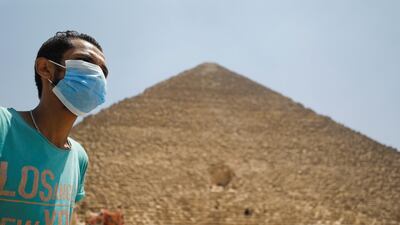Egyptians are relieved to put June behind them after the month brought the worst coronavirus death toll so far.
But July brings new fears after the government removed most of the measures to contain the pandemic.
Restrictions were further eased on Wednesday, when Egypt’s airports opened for the first time since March.
EgyptAir, the country’s national carrier, had 14 scheduled flights on Wednesday in addition to the start of a 33-flight operation with other airlines to bring home 5,225 Egyptians stranded abroad.
Several tourist sites also reopened for visitors on Wednesday, including the Giza pyramids and the Egyptian museum.
But Egyptians are approaching the coming weeks with trepidation after June brought more cases and deaths caused by Covid-19 than the previous four months combined.
With the month’s statistics making for harrowing reading, there are concerns that the government may have acted in haste when it lifted most restrictions on June 27.
The government said that, with a vaccine yet to be developed, Egyptians must learn to live with Covid-19 while adhering to preventive measures and embracing strict hygiene practices.
But some Egyptians are wistfully looking back at the perceived peace and quiet that replaced their hectic city lives during three months of lockdown.
It included a night-time curfew, closed restaurants and cafes, shops shutting at 5pm and the cancellation of cinema and theatre shows.
Public beaches and parks remain closed.
“So many people are out on the streets now, cars blow their horns late at night and the roar of muscle motorbikes shatter the quiet of the night,” lamented a woman, 58, who lives in a leafy suburb south of Cairo.
“Life was so much better under the curfew."
The latest relaxation of the lockdown has allowed public transport to operate until midnight and tea houses, where millions of Egyptians gather to drink tea and coffee or play backgammon and dominoes, are permitted to open until 10pm.
Shisha pipes remain banned for now and government departments are operating with a skeleton staff to avoid the spread of the disease.
But some Egyptians are taking a more casual approach. Many do not wear masks in tea houses or on public transport, and there is a general failure to enforce social distancing in public spaces.
The government disagrees with critics of reopening the country, saying a sustained lockdown would cause an economic meltdown.
That would wipe out hard-won gains made during years of austerity policies to overhaul an economy battered by the turmoil that followed a popular 2011 uprising.
The government said that continuing lockdown would push millions of daily-wage Egyptians and their families into destitution.
Businessmen have supported the government, claiming a tanked economy could be deadlier than Covid-19.
While many Egyptians are anxiously waiting to see whether the country's reopening will be reflected in the number of Covid-19 cases and deaths, they are horrified by the June figures.
Government officials said the curve would level off in July before flattening by the middle of the month.
As of Tuesday night, the total number of confirmed Covid-19 cases stood at 68,311, of which 63.2 per cent were recorded in June.
The total number of deaths since the outbreak in February is 2,953 of which 67.1 per cent were recorded last month.
The final week of the month was particularly grim, with 10,170 recorded cases, or 14.8 per cent of the total number.
Covid-19-related deaths stood at 588 in the last week of June, amounting to 19.9 per cent of all fatalities since February.
“It’s difficult to enforce social distancing when Egyptians are known to love to socialise in crowded places,” said a businessman, who runs an upmarket restaurant and a cafe in Cairo.
“When authorities said cafes and restaurants will reopen but must operate at only 25 per cent capacity, I said they must be joking.
“I rearranged the tables to conform with social distancing and my restaurant looks really ugly now.”























